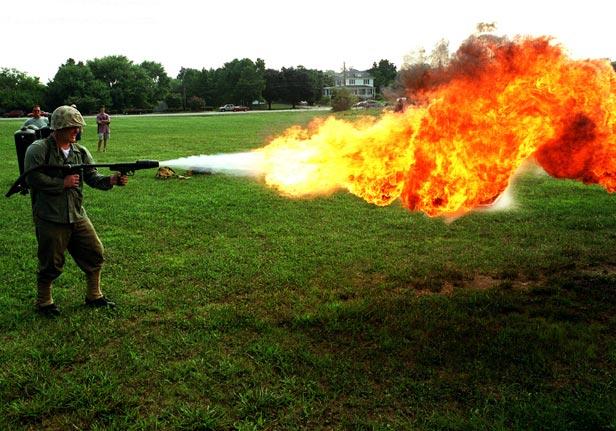Time for a Good Old Book Burning

This is one of those books that I have known about for quite a while but never got around to reading it until quite recently. In fact it wasn't until I was browsing a bookshop in Sydney that I came across a copy of it, and it didn't take me all that long (in fact it was instantaneous) to add this book to the pile that I was already planning on purchasing (and the owner was pretty impressed that it took me less that a couple of minutes to have made my selection – I'm a bit like that in bookshops). Anyway, I first heard about this book when I was a kid, namely because there was an adventure game for the Commodore 64 with the same name (and I had no idea what it was about at the time). However, seeing it sitting on my bookshelf for the last couple of months finally prompted me to take it down and read it.
Anyway, I'm sure many of you know what this book is about – a future society where books are illegal and there is an elite squad that goes out raiding houses they believe have a secret stash of books, and then burn the house, the books, and arrest the occupants. Not surprisingly this elite squad are called the fireman, though unlike the firemen of today their job is to start fires, not put them out. The reason for this is because houses don't burn down anymore, unless they are given a bit of a push by the fireman (who run around with flamethrowers by the way).

The protagonist of the story, Guy Montag, happens to be a fireman and one day he is out for a walk (which is also technically illegal because people who walk tend to think, and thinking is bad) when he meets a young lady named Clarice. This encounter changes his life and instead of burning books he starts collecting them. However his little hobby (which is very much on the illegal side) soon gets him into trouble, and he very quickly finds himself on the run. Mind you, being a fireman gives him a bit of an advantage because he actually knows all of their tricks and tactics so he is able to avoid them.
Okay, the modern world may not be anywhere like Bradbury's world, however one of the ideas behind this book was that he could see it heading this way, especially with the advent of the television. The thing with the television is that as a form of mass media it can very easily be used to control the thoughts and beliefs of the population. Cinema plays the same role, and in many cases the only things that we see on television is that which the government and industry wants us to see. The thing is that the cost to set up television stations, and to also produce content, is prohibitive, meaning that only governments, and major corporations, are able to do so.
However we are beginning to see the power of the mass media provider under attack with the rise of the internet. In fact these days anybody with a smartphone, a computer, and an internet connection, can create content. However the catch is that there is so much content out there that it can be really difficult attracting people to view (or read) it. Still, the power of the internet is able to undermine the dominance for the mass media providers, however we still have a problem in that the infrastructure is controlled by powerful corporations who are constantly seeking the power to restrict access to sites that they don't particularly like (through undermining concepts such as Net Neutrality).
As for books, well people still read them, and it isn't illegal to own your own library, however there is still some subtle pressure against people who spend too much time reading books. For instance it seems to be okay for people to walk down the street reading their smartphones, however do that with a book and you seem a little odd. Also, while I feel comfortable reading books in the inner-city pubs and bars, when I go out to the suburbs I begin to feel out of place. In fact while I may not have been hugely challenged, I do tend to attract the wrong sort of attention. However, things have always been like that, and in the past intellectuals generally didn't wander into working class pubs and sit in a corner and read a book. Another thing that struck me is that I am surprised nobody has ever come up to me in one of those pubs and ask if they could buy any drugs – I don't know but reading a book in a working class pub makes me feel as if I'm a drug dealer of sorts.
So, I guess the question arises – why do they burn books. Easy – books and cheap to produce and distribute, and it can be very difficult to control the content. While the television stations acted as gateways for content, anybody with a type writer and photocopier can produce literature. In fact with the rise of mass publication also saw the rise of underground newspapers, something you still see very much today. Printing also allows rebellious ideas to be spread – Martin Luther did that with regards to the reformation – at it also has the ability to undermine government control. Books make us think, and thinking is dangerous because it means that we question authority and realise that we have a choice to say no. The ruling class does not like people saying no, or challenging their authority, which is why in the past (and in many cases still are) book burnings.
 3
3


